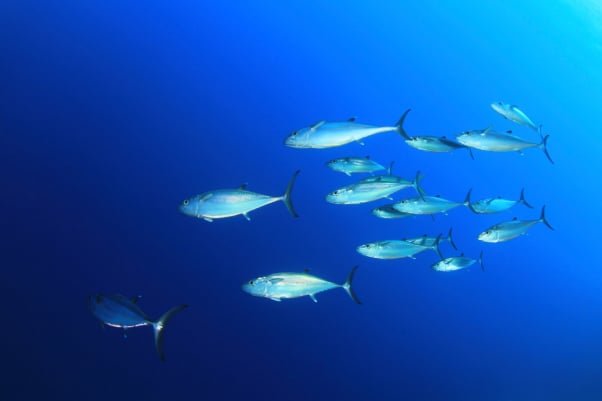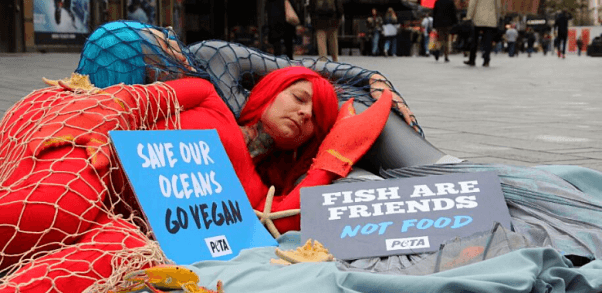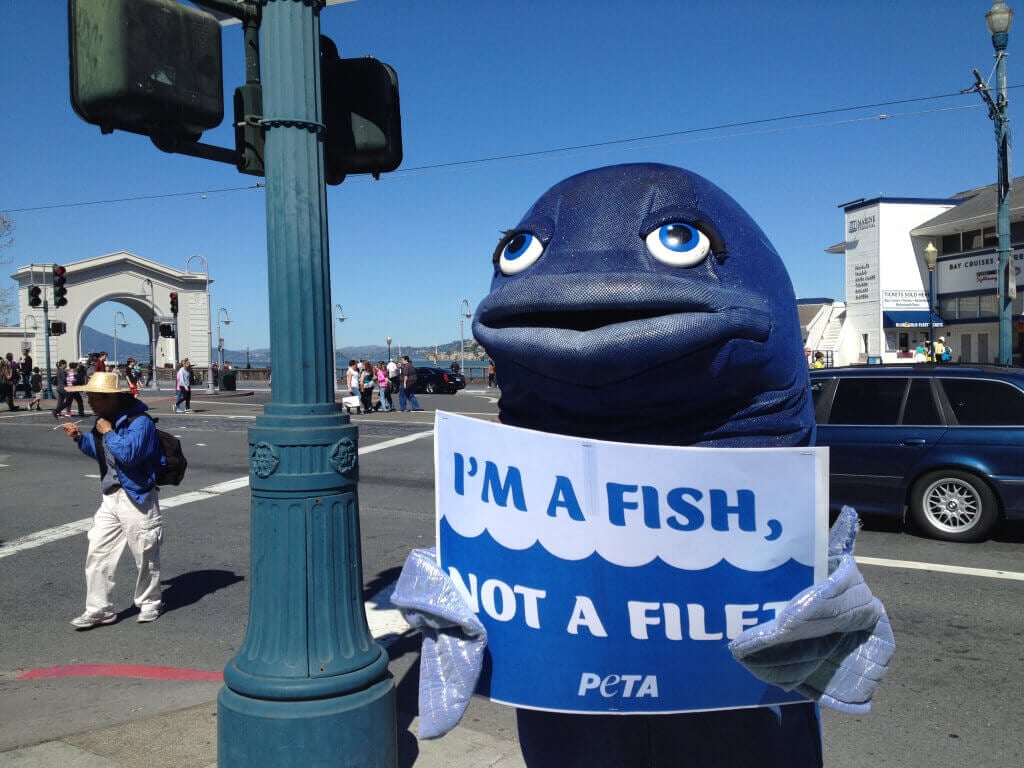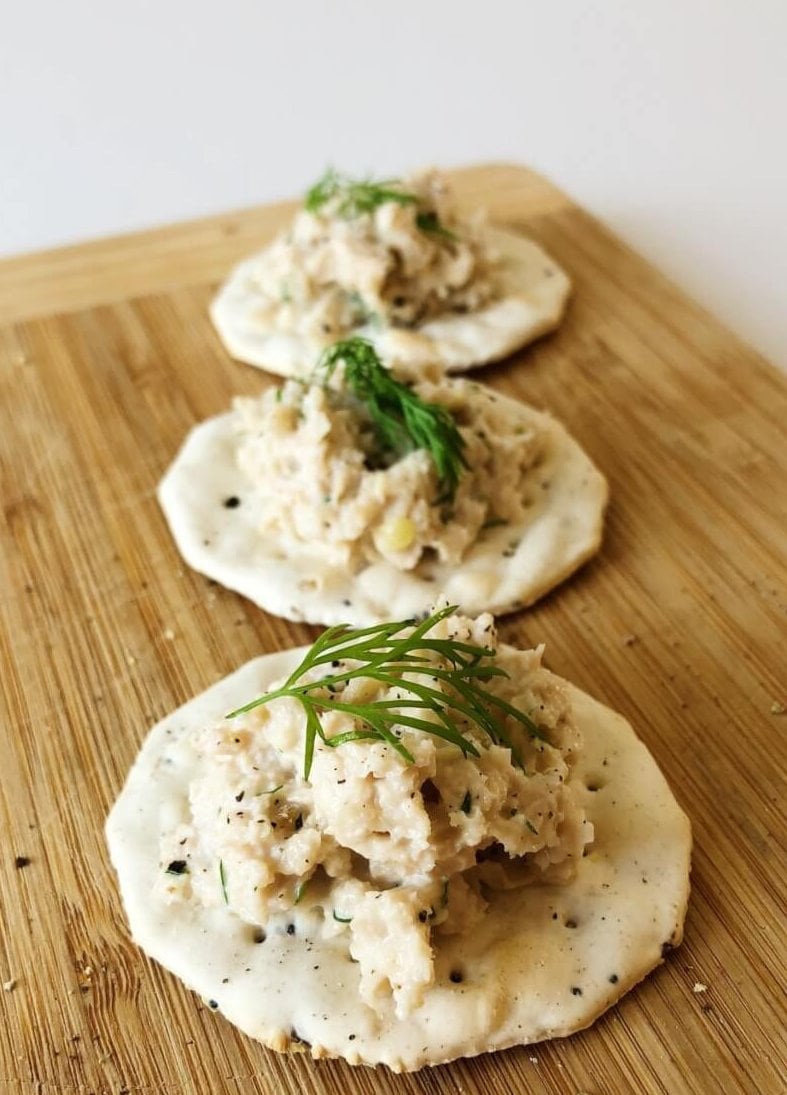1. Brain Rot
Tuna fish accumulate toxic mercury in their flesh as a result of industrial pollution, and the side effects of mercury poisoning include finger curling, cognitive impairment, and coordination problems. A California boy, who was the subject of a front-page Wall Street Journal article, went from being a star athlete and honor student to being unable to concentrate or catch a football because he ate canned tuna. Even if he had eaten only half a can of albacore tuna a week, he still would have consumed 60 percent more mercury than is considered “safe” by the U.S. government.
2. Tremendous Tuna
The largest tuna are bluefin tuna, who can reach 15 feet in length and weigh more than 1,500 pounds. Even “small” tuna species, such as yellowfin and albacore, can grow to be 6.5 feet long and weigh hundreds of pounds. Tuna aren’t exactly couch potatoes—they can swim more than 100 miles in a day—with a top speed of 40 miles per hour.

3. Heart Attack on a Hook
Eating fish is not healthy for your heart! Heavy metals are concentrated in tuna because of the contaminated fish they eat. Tuna flesh is loaded with heavy metals that attack the heart muscle, so the toxicity outweighs any possible health benefits of omega-3 fatty acids. According to a recent study published in the American Heart Association’s journal, men with the highest levels of mercury increased their risk for heart disease by 60 percent and their risk of dying of a heart attack by 70 percent. Do your heart a favor—put down the fish fork and pick up a safer source of omega-3s, such as walnuts and flaxseeds.
4. Would You Eat Your Dog?
How about a fish who’s as smart as a dog? Dr. Theresa Burt de Perera, an Oxford University scientist, recently published research showing that fish learn faster than dogs. And University of Edinburgh biologist Culum Brown says, “In many areas, such as memory, their cognitive powers match or exceed those of ‘higher’ vertebrates, including non-human primates.”
5. Sorry, Charlie
Unlike a certain cartoon tuna, fish aren’t begging to be caught. Tuna are chased until they move into a tight group, and then a net is lowered around them. They are dragged against rocks and debris, and some fish suffocate from the sheer weight of other fish pressing against them. Large tuna are impaled on longlines—which are miles of barbed hooks that are left in the ocean for days at a time.

6. Death, Sopranos-Style
Think “swimming with the fishes” in reverse. “Hit men” dump smaller tuna onto ice, where they slowly freeze to death or are crushed when thousands of their schoolmates are piled on top of them. Tuna caught on longlines are beaten until they become unconscious before they are thrown into the freezer—and that’s if they haven’t already bled to death while struggling to free themselves!
7. Factory Fish Bowls
Because fishing trawlers are increasingly emptying the seas of more and more of their inhabitants, fish are now being raised on “farms.” Small tuna are captured and dumped into netted pens. They are fattened on pellets of concentrated fish flesh and killed when they get big enough—if they don’t die first from the parasites and diseases that thrive in extremely crowded conditions.

8. Sickening Sashimi
Stay away from the sushi buffet if you don’t want to spend the next day at the porcelain palace. Seafood is the number one cause of food poisoning in the United States. According to the Centers for Disease Control and Prevention, there are about 75 million cases of foodborne illness every year, including hundreds of thousands of hospitalizations and thousands of deaths.
9. Dolphin-Unsafe Tuna
Tuna is about as “dolphin-friendly” as a boat propeller. Even if dolphins aren’t “accidentally” trapped in tuna nets, they are still killed intentionally by Japanese tuna anglers because they prey on tuna. Entire pods of whales and dolphins are rounded up and driven into shallow water where all but the youngest (who are captured and sold to aquariums) are slaughtered with knives and machetes.
10. Tuna-Safe Tuna
Vegan tuna is perfect for sandwiches, casseroles, and “fish” cakes. It is packed with protein and has an uncanny “tuna” flavor and texture, but it’s free of mercury, harmful bacteria, and suffering. If you’re fishing for a way to reverse heart disease while also reducing the risk of suffering from cancer, diabetes, and obesity, going vegan is the perfect catch. Plus, it’s fish-friendly and great for the environment.

Order a free vegan starter kit and we’ll send you great-tasting recipes, nutritional information, and everything else that you’ll need to go vegan:







